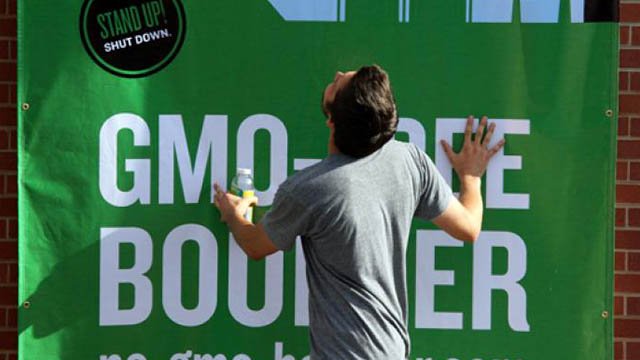What does is take to ban GMOs? In a word: persistence.
GMO Free Boulder exemplifies the resilient spirit and dedication necessary to overcome the odds. Working together over a period of five years, this amazing group of non-GMO heroes can claim victory. This is their story:
We Win! GMO Free Boulder Finally Wins GMO Ban on 25,000 acres of Boulder County Open Space
In a herculean effort against Monsanto and Big Ag, a group of dedicated citizens in Boulder, Colorado banded together to win an unprecedented ban of GMO crops on 25,000 acres of public farm land.
In 2011, Mary VonBreck co-founded a project called GMO Free Boulder with two colleagues, Mark Retzloff, Founder, Horizon Organic Dairy, Alfalfa’s and Steve Demos, Founder, Silk Soy Milk, Whitewave and GoodBelly Probiotic Juice Drink. Together with thousands of citizens in Boulder County we worked side by side to protect human health and our environment from the chemical agribusiness giants that were using our public farm land for the benefit of a small handful of GMO adherents.
In 2012, we elected two new County Commissioners who campaigned on a platform to ban GMOs. Today, Elise Jones and Deb Gardner did just that.
The journey ended March 17, 2016 with a directive from the Boulder County Board of Commissioners to the staff at Open Space to end the use of GMOs. The current policy enacted in 2011 to allow GMO corn and sugar beets expires in December of this year. A timetable will be discussed to allow GMO farmers the opportunity to transition to other crops and agriculture systems.
Commissioners were concerned about the use of glyphosate, a probable carcinogen according to World Health Organization, as well as neonicotinoids, an insecticide thought to be a leading driver of bee colony collapse that is now being banned in Home Depot and Lowe’s, as well as Boulder’s own McGuckin’s. Open Space staff testified last month that there were no GMO seeds currently in use here that were not coated in the insecticide. GMO crops are designed to withstand the powerful pesticides that sterilize the rest of the living matter in the soil. Since its inception in 1996, GMOs now comprise more than 90% of corn, sugar beets, soy and canola nationwide. The patented pesticide known as RoundUp kills organic crops which are threatened by trespass of the chemical through aerial spray onto neighboring farms. Boulder County lost an organic farm in just this way in 2010.
Responding to taxpayers who, by survey, were overwhelmingly in favor of a ban on GMOs and neonics and a moratorium on glyphosate, Commissioners concluded that Open Space farm land should not be controlled by large multinational corporations which Commissioner Elise Jones said was, “counter to where we are going” as a county. Jones continued, “The role for Boulder County should be moving to sustainable agriculture, and GMOs are not consistent with this vision.”
“I also believe it is essential that as we transition to a different cropping system, that we help identify and pilot better alternatives that support our local farmers,” said County Commissioner Chair, Elise Jones. “I envision Boulder County to be a national leader in proactive, sustainable, regenerative agriculture, and this is a critical step to ensuring that farming practices on our open space lands serve as a model for addressing climate change and enhancing the quality of our air, soil, and water for generations to come.”
It seems this Board heard the voice of the community that also asked for public farm land to be used for local farming and not large agribusiness operations. Scott Smith and Mary Smith of the community group GMKnow, and original members of GMO Free Boulder, submitted a Citizen’s Cropland Policy in 2011, written by scientists Mary Mulry PhD, a food scientist and consultant for organic products and Rich Andrews, a local hops farmer and environmental scientist. It was signed by over 3,000 citizens and posted on the conference room walls during the 2011 marathon hearings in Boulder. The policy was written in accordance with the Boulder County Sustainability Goals and outlined land use policy that would use public farm land for local, organic and sustainable food within the county, reduce pesticide use, sequester carbon and increase soil health and water quality. It appears that many of the issues outlined then may now be implemented in the updated Cropland Policy that goes into effect in January of 2017.
Commissioner Cindy Domenico spoke on behalf of the 9 GMO farmers, calling for a transition plan that will allow them to stay on the land while they find other crop solutions. It is unclear why those farmers would require that time as their current leases for the public land are one year contracts. If those farmers cannot comply to the Cropland Policy, the land should be leased to farmers who can use regenerative and sustainable large-scale farming practices. There was no “transition period” needed when GMOs were allowed in 2011 and there should be none needed when the policy expires in December 2016. Domenico also suggested increasing the staffing at Open Space and directed the Board to look for funding to accomplish that goal. We agree with that directive as the Transition to Organic mandate to be at 20% organic by 2020 will require staffs that are educated in farming beyond GMO chemical agriculture.
Boulder County Commissioners showed tremendous courage in casting their vote for this ban. They are to be commended and we look forward to the bright future they have made possible. We can once again believe we are actually living in Boulder, Colorado.
If you are interested in securing a ban on GMOs in your community, please contact Mary VonBreck at no.gmo.boco@gmail.com.
You can also join the Citizens for BioPesticde Solutions, a community group for families and communities opting for BioPesticides for their homes, schools, parks, golf courses and HOA’s.


